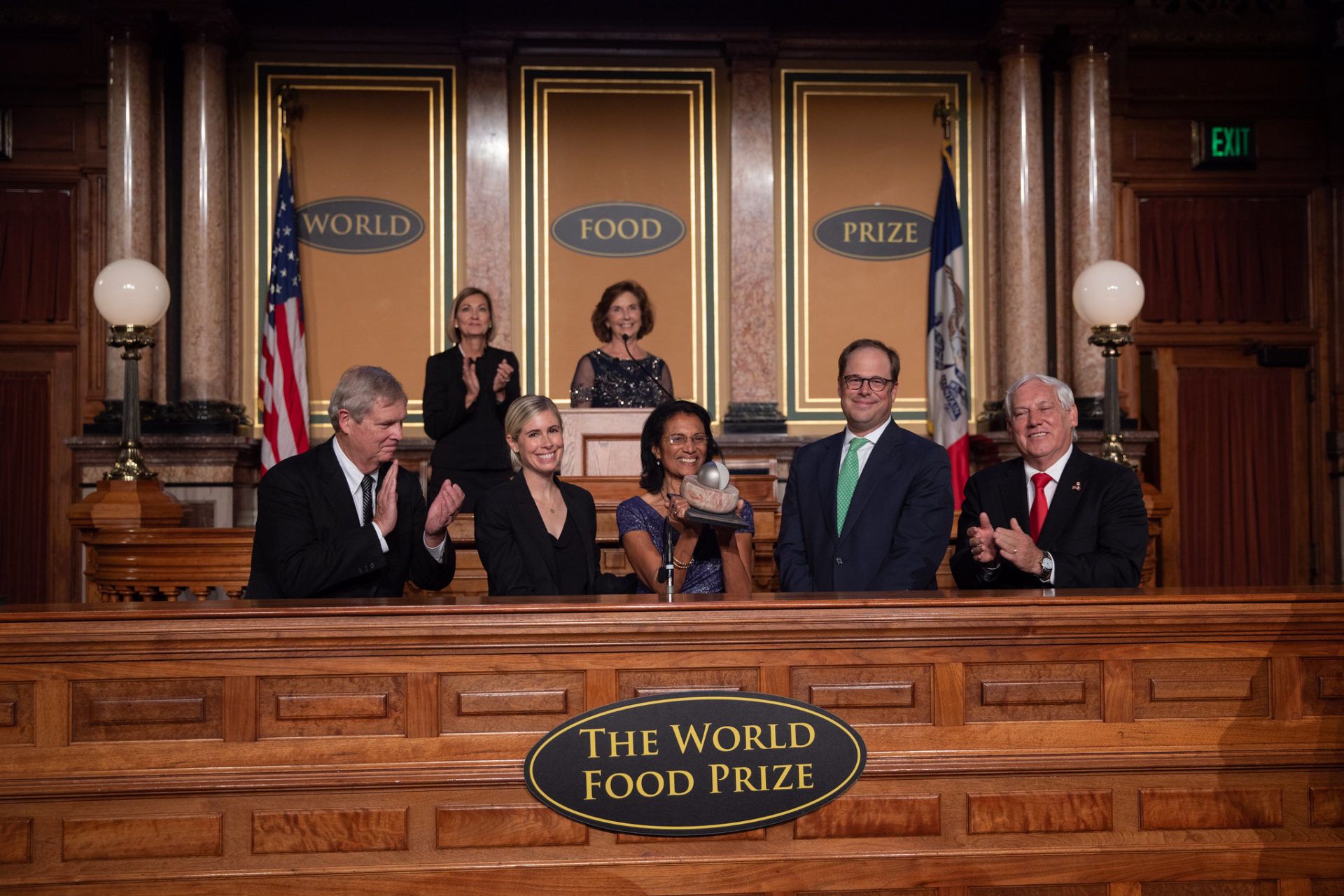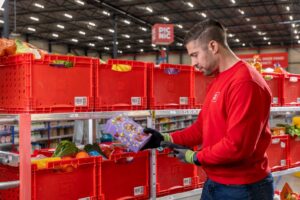Iowa’s role as a leader in agricultural production is well known. The state is also leading the way in fighting food insecurity from farm fields and livestock barns to consumer plates.
“In every corner of the state and every aspect of the food system, Iowans are looking for opportunities to increase the amount, quality, nutrition and safety of our food supply in a sustainable way, and ensure that it is distributed to those who need it,” said Billi Hunt, executive director of America’s Cultivation Corridor. “Whether it is higher yields in the field, preserving quality longer in storage, or strong support of food bank systems, we are constantly looking for innovative approaches to reach the goal of zero hunger.”
Legacy of innovation
Iowa’s agricultural heritage has produced renowned leaders in increasing food production. From George Washington Carver and Henry A. Wallace to Norman Borlaug, generations of Iowans have worked to not only provide food for farmers and their families, but ensure they are meeting needs of those in our communities, country and the world.
Headquartered in Des Moines, the World Food Prize Foundation’s mission is to elevate innovations and inspire action to sustainably increase the quality, quantity and availability of food for all.
“For more than 35 years, the World Food Prize Foundation has worked to recognize individuals making achievements in food security, bring together global leaders to address issues and innovations, and to encourage students around the world to join the next generation of hunger fighters,” said Barbara Stinson, President, World Food Prize Foundation. “Our location in the heartland of the country and center of production agriculture is the ideal location to inspire and celebrate innovations that will help achieve food security on a global level.”
The 2022 World Food Prize Laureate Dr. Cynthia Rosenzweig will be honored at a ceremony on October 20 in the Iowa State Capitol, culminating a week of in-person and virtual events including the Norman E. Borlaug International Symposium, Global Youth Institute and numerous side events and programs all focused on addressing the most pressing food security issues in a changing world. More than 600 leaders from around the globe will convene in Des Moines, with many more joining in virtual events.
Public, private sectors focused on next generation of solutions
The fight against hunger starts at the first steps of agricultural production, with research and development to increase the quantity and quality of crops and livestock that farmers raise, in Iowa. Research from both public and private sector is key to bringing the innovations and technologies that farmers of all sizes need to meet demands of a growing world population in a changing climate.
Iowa State University is leading the way in a number of areas, including its Seed Science Center, which is the largest public seed testing laboratory in the world. The center can test more than 300 different plant varieties for diseases and pathogens, serving as an important resource for the industry and public scientists. The center is also committed to providing quality research and education to produce the next generation of leaders in the seed industry.
“University research is critical to help develop innovations to feed a growing world in a sustainable fashion,” said Dr. Wendy Wintersteen, President of Iowa State University. “Work done at Iowa State University plays a unique role in both basic and applied science. This fuels long-term innovation and new opportunities for ag producers and businesses in Iowa.”
The Iowa State University Veterinary Diagnostic Lab is part of the university’s College of Veterinary Medicine and is a national leader in protecting animal and human health, with full-service laboratories that process more than 1 million tests each year. The lab is critical to the U.S. food supply by processing more than 80% of the country’s diagnostic submissions for the pork industry, helping detect diseases and share information.
Currently under construction is the first phase of a new Veterinary Diagnostic Lab facility, which will ensure the most updated technology and facilities for disease detection and surveillance. The project is slated to be completed in 2023, with plans already underway for Phase 2 of the project.
In the private sector, companies of all sizes from startups to global leaders are focused on improving the quality, quantity and affordability of food supply, and the ability of farmers to raise crops more sustainably than ever before.
Iowa’s start-up ecosystem provides a strong foundation of success with proximity to Iowa State University and private world-leading research institutions. Two examples include Dryland Genetics, Inc., founded by two professors at Iowa State University and University of Nebraska, is focused on improving the yield of proso millet, an ancient grain that requires significantly less water than crops like corn, with existing markets as a food and feed crop. Continuum Ag provides tools and services for farmers and their consultants to better understand soil health and adopt regenerative agricultural practices that will boost sustainability and productivity.
“Our number one priority is increasing economic resilience and environmental sustainability
for family farms,” said Mitchell Hora, Founder and CEO of Continuum Ag. “We know that when family farms thrive, rural communities are strengthened and the legacy of America agriculture is enhanced.”
Practical solutions for storage, processing
Food loss and waste occurs at every step in the food system, and a number of Iowa companies are working to preserve quality from harvest field to retail shelves.
Sukup Manufacturing Co. was founded in 1962 by Eugene Sukup after he was frustrated with grain spoilage in a grain bin he purchased. From Eugene Sukup’s first Stirway automatic stirring machine for grain bins to its role as the world’s largest family-owned and operated manufacturer of grain storage, grain drying and handling equipment and steel building today, Sukup Manufacturing Co. is focused on providing equipment and facilities to protect the quality of grain on-farm and beyond.
Sukup Manufacturing sponsors a global food security award with the American Society for Ag and Bioscience Engineers. This is a way to recognize and encourage an enhancement of food security by engineering or the application of engineering and production or distribution of food. The latest recipient has worked in West Africa and soil health and using cover crops and maintenance of farm equipment because that does increase productivity and increases the food supply from the land.
Des Moines-based Kemin Industries is a family-owned-and-operated global ingredient manufacturer whose products help protect the health and safety of people, pets, production animals, plants and the planet.
“Since our founding in 1961, Kemin has evolved and grown to produce more than 500 specialty ingredients across six continents for customers in more than 120 countries,” said Kimberly Nelson, President, Kemin Nutrisurance, the company’s pet food and rendering technologies business unit, and granddaughter of Kemin’s founders. “Whether protecting the quality of feed ingredients in livestock rations or developing specific solutions to better preserve foods for consumers, our global team is working every day to improve the world’s food supply. Our role in safeguarding the global food supply chain, as well as our work in the other industries we serve, contributes to our vision to sustainably transform the quality of life every day for 80% of the world.”
Iowa State University is also focused on reducing food loss and waste as a member of the Consortium for Innovation in Post-Harvest Loss & Food Waste Reduction. The consortium includes strategic public-private partnerships that provides farmers across the globe with technology and strategies to gain more value from their crops. These technologies and strategies stimulate local economic growth and improve access to affordable, healthy food.
Fighting hunger in our communities
In a state that leads the world in food production, food security is still a challenge for many Iowans, with 1 in 14 citizens facing hunger and the situation was worsening from the pandemic. Efforts across the state are working to create awareness and inspire action from all segments of the food system.
Hy-Vee is committed to serving a vital role in closing the food insecurity gap that exists in the communities it serves. From food bank donations to annual holiday meal giveaways and events that feed thousands, Hy-Vee continuously plays an instrumental role in the elimination of hunger. The grocery retailer also employs dietitians who are readily available to assist customers free of charge, and is working to grow its outreach programs – both in person and virtually – so everyone can have access to viable resources to assist in their health and food security journey.
At the recent White House Conference on Hunger, Nutrition and Health in Washington, D.C., Hy-Vee Chairman and CEO Randy Edeker stated that the company will deliver 30 million meals to vulnerable communities by 2025, as well as deploy its registered dietitian team to educate 100,000 Americans in areas of low food access on healthy eating and nutrition by 2026. The commitment builds on the company’s long-standing focus and ongoing community efforts to fight hunger.
“During these challenging economic times, we know more families are turning to food banks and community resources for assistance, and that’s where we can help,” said Edeker. “By providing 30 million meals by 2025 and providing health and nutrition education to 100,000 Americans by 2026, we can better the lives of those families who are currently food insecure. Our ultimate goal is to reduce the number of people who are food insecure, because no one should ever have to worry about where their next meal will come from.”
As the World Food Prize celebrates the work of 2022 laureate Dr. Rosenzweig and leaders from around the globe convene to discuss the challenges and opportunities of feeding a fragile world, the innovators, farmers and leaders in America’s Cultivation Corridor remain committed to fighting hunger and food insecurity at every link in the food chain. Learn more about the Corridor on our website and sign up for our monthly newsletter.





